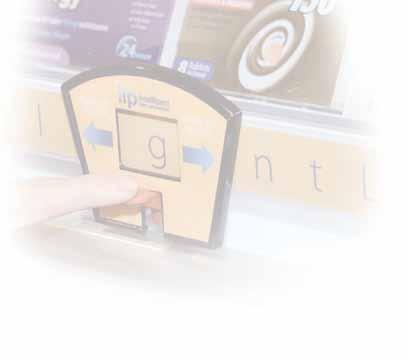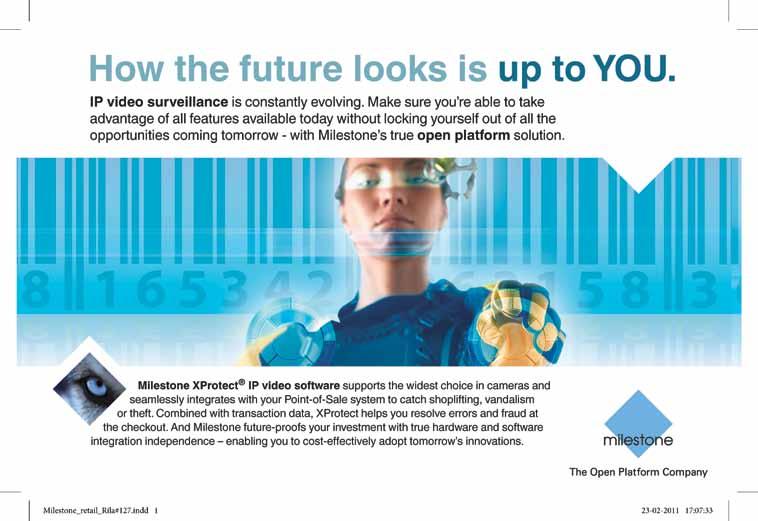
6 minute read
CERTIFICATION
Connecting Retailers with Informed, Motivated College Candidates
Many of us in the loss prevention profession didn’t dream of one day being the vice president of a loss prevention department for a major retailer. In fact, many of us didn’t even know what loss prevention was when we started selecting college courses or formulating our career plans. When completing surveys and profiles of likes, dislikes, preferences, habits, and tendencies with career guidance counselors in school, do you remember ever seeing a career in loss prevention included among the possible choices? Probably not.
The truth is many of today’s seasoned loss prevention professionals stumbled on this industry quite by chance. Loss prevention for many started simply as a part-time job while going to school for criminal justice. For others it was a temporary position that turned permanent while waiting for acceptance into a law enforcement agency. While for others still, a career in loss prevention evolved from working in different positions in store operations. Whatever the case, individuals who specifically sought a career in loss prevention are few and far between.
An Industry Paradox
This pattern has created a paradox for our industry—loss prevention isn’t a career choice because the depth and offerings of our profession and industry are uncharted. Most troubling isn’t the perception of loss prevention or an unnamed stigma related to it. On the contrary, it is simply that there is no perception, understanding, or even remote familiarity of what loss prevention is. The result is high turnover of entry-level positions, the necessity for extended training periods, and shallow benches for succession planning.
Fortunately the tide is turning and there is significant movement in efforts to raise awareness at the college as well as high school levels for loss prevention and asset protection as a viable and rewarding career choice. This momentum is also being pushed by the increased expectations of senior retail management. Loss prevention is now expected to contribute millions of dollars to the
by Catherine Penizotto
Ms. Penizotto is currently working with the Loss Prevention Foundation on the Academic and Retail Partnership Program. She is the owner of OPTIC Loss Prevention LLC, a consulting and liaison firm founded in 2010. She has thirty years of retail management experience, including specialty clothing, full-service automotive aftermarket, grocery, and discount big-box retail. Penizotto has been a mentor in the National Retail Federation’s Women in LP Caucus and is also a member of the LPC exam committee for the Foundation. She can be reached at catherine.penizotto@losspreventionfoundation.org or 315-380-7740.
corporation’s bottom-line profit, which requires LP teams to learn the retail business and therefore requires a better-educated team.
In 2006 the Loss Prevention Foundation was formed by industry advocates to advance the loss prevention profession by providing relevant, convenient, and challenging educational resources to help answer the growing need for better-qualified LP teams. The Foundation created two certification programs, the LPQualified (LPQ) and LPCertified (LPC), which are designed to give individuals the opportunity to gain valuable knowledge about retail, business, leadership, and loss prevention for both entry-level and experienced individuals.
Still, the need to introduce loss prevention to young people looking to start a career remains. To this end, the Foundation has instituted the Academic and Retail Partnership Program.
Connecting Retailers with Students
Since its inception, the Foundation has partnered with both colleges and retailers. Now, the Foundation is taking that experience a step further by forging partnerships directly between the retailers and colleges themselves.
The Academic and Retail Partnership Program serves to connect select retailers with colleges offering courses of relevant study. Partner colleges will introduce the Academic and Retail Partnership Program to students in retail management, criminal justice, and accounting courses in the students’ junior year of study. Participating students will complete the LPQ course and sit for the proctored exam. LPQualified students will be offered an interview with a participating retail partner.
The retail industry has much to gain from this program. While the LPQ curriculum is focused on loss prevention, much of what students learn from this course translates into other areas within a retail environment, such as store operations, risk management, crisis management, safety, distribution, analytics, finance, and audit. The program gives partnering retailers a unique opportunity and advantage to bring on new college-educated talent with a broad understanding of loss prevention and a foundation of retail knowledge gained from the LPQ course.
On the other hand, students also have much to gain. With many college graduates today facing a job market heavy with experienced, skilled, and degreed professionals looking for work, it can be both challenging and frustrating for recent graduates without relevant experience to get their foot in the door and secure a position in their industry of choice. Fresh with the knowledge gained from their college curriculum and complemented with the industry-specific practical studies of the LPQ, students from participating colleges will have the advantage of meeting with hiring decision makers, thus opening the door to career opportunities that are both varied and plentiful.
The Foundation board of directors recognizes that in order to continue their mission of advancing the profession, the Foundation must act as the conduit for partnerships between colleges and retailers. By giving college graduates an express line into major retailers’ recruitment offices, it is easier for retailers to identify high-potential applicants. This partnership will be a catalyst for elevating the loss prevention industry and raising the bar for talent levels in our industry.
And that’s not all. Retail organizations, such as the Retail Industry Leaders Association (RILA) and the International Organization of Black Security Executives (IOBSE), are reaching out to college students and welcoming them to their conferences as well as offering scholarships to those with an interest in loss prevention, retail management, or a related field. Other organizations, such as the National Retail Federation (NRF) have invited professors to attend their conferences and are assisting in employer-led initiatives that connect companies with community colleges to ensure students are better equipped with skills for today’s workforce. These organizations and other associations, including the Food Marketing Institute (FMI) and the National Food Service Security Council (NFSSC), have also contributed to and continue to support the creation of specialized college degree programs.
Solution providers, such as Vector Security, have also demonstrate that they, too, recognize the value of educating the next generation of loss prevention professionals through their generosity of awarding scholarships to students.
With the consensus goal to make the loss prevention industry a career choice through awareness, partnerships, and aptly focused programs, we will soon see loss prevention and asset protection as choices on those career path surveys. We will hear loss prevention and asset protection discussed as options in college courses beyond criminal justice. And we will see our industry infused with talented individuals flourishing in their intended career.
Reward honest shoppers with assistance-free vending.
SelectSafe™
Shoppers slide “Selector” to desired product and press button until product is dispensed into the bin below.

• Slow feed dispensing prevents sweep. • No batteries or power required. • Modular design lets you confi gure ideal layout. • Available for pegged or pushed products. • Use with 36” or 48” gondolas. Contact us: • Custom confi guration available. info@intelligentlossprevention.com www.intelligentlossprevention.com 800.747.4384






